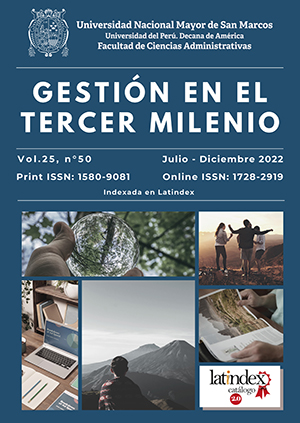La vivienda informal y el impuesto predial
DOI:
https://doi.org/10.15381/gtm.v25i50.24293Palabras clave:
tráfico de tierras, desborde social, informalidad, recaudación, catastroResumen
El presente artículo busca esclarecer la relación positiva entre la inclusión de las organizaciones informales bajo un registro que permita la recaudación del impuesto predial como respuesta al auxilio en la entrega de constancias de posesión para el acceso a servicios básicos. La metodología se ha realizado bajo una investigación de tipo no experimental y descriptiva, la cual ha evidenciado una carencia de capacidades estatales para impedir las invasiones. Además, se suma una debilidad en la capacidad recaudadora tributaria para un grupo particular ya titulado y registrado por lo que se intenta resolver una problemática social alegando a la necesidad, pero sin una gestión municipal planificada que pueda mitigar atenciones básicas como salud, seguridad y otros a partir de un eficaz recaudo tributario. La figura del sujeto pasivo del impuesto predial se ajusta a una interpretación literal. Sin embargo, la realidad muestra que existe una masa importante y considerable que vive bajo una situación de posesión. Las conclusiones muestran que la pasividad en el enfoque recaudador generará mayores perjuicios a futuro, pues se ha demostrado que la ausencia ya instaurada tanto en la fiscalización como en la restricción de invasiones ha conllevado a que estas acciones se mantengan y prosperen.
Descargas
Publicado
Número
Sección
Licencia
Derechos de autor 2022 Joaquin Ernesto Marquez Valdez

Esta obra está bajo una licencia internacional Creative Commons Atribución 4.0.
LOS AUTORES RETIENEN SUS DERECHOS:
a. Los autores retienen sus derechos de marca y patente, y tambien sobre cualquier proceso o procedimiento descrito en el artículo.
b. Los autores retienen el derecho de compartir, copiar, distribuir, ejecutar y comunicar públicamente el articulo publicado en la revista Gestión en el Tercer Milenio (por ejemplo, colocarlo en un repositorio institucional o publicarlo en un libro), con un reconocimiento de su publicación inicial en la revista Gestión en el Tercer Milenio.
c. Los autores retienen el derecho a hacer una posterior publicación de su trabajo, de utilizar el artículo o cualquier parte de aquel (por ejemplo: una compilación de sus trabajos, notas para conferencias, tesis, o para un libro), siempre que indiquen la fuente de publicación (autores del trabajo, revista, volumen, numero y fecha).






